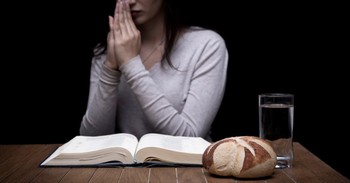
"I understand the church of God in a wide sense," said John Frith. "It contains all those whom we regard as members of Christ. It is a net thrown into the sea."
John Frith was a man of peace in an age that fought and killed over religious ideas. John believed that any person who lived a godly life for the sake of Christ, belonged to Jesus, whether or not that person held John's views. "The opinions for which men go to war," he said, "aren't worth the terrible tragedies that they make. Let there be no longer any question among us of Zwinglians or Lutherans, for neither Zwingle nor Luther died for us, and we must be one in Christ Jesus." [Some of these quotes are given in modern English].
And yet, on this day, July 4, 1533, John Frith, the man of peace and purity was burned to death at the stake because of his religious views. John had quoted scriptures to argue that the bread and wine do not actually turn into Jesus' flesh and blood. He also denied that there is a purgatory after death. "A purgatory! there is not one only, there are two. The first is the Word of God, the second is the Cross of Christ: I do not mean the cross of wood, but the cross of tribulation."
John did not seek martyrdom, but he was willing to face it. Having joined with church reformers during his years at university, he was thrown into prison. When freed, he joined William Tyndale in Germany and helped him with his Bible translation. But when he remembered the people in England who did not understand how to come to God, he felt he had to go back, however much danger there was to him.
In England, John Frith was arrested as a vagabond. He dared not give his name lest he be executed; he saved himself by quoting elegant Greek and Latin lines to a local scholar. After his release, he secretly went from place to place preaching. Sir Thomas More, who was chancellor to the king for the rest of that year, ordered John Frith arrested. He offered a great reward to anyone who would deliver him over to the authorities. More's agents hunted everywhere for John just as they had hunted everywhere for William Tyndale. John planned to escape back to the Germany. But he was betrayed as he tried to board his ship. He was sent to prison. While in prison, he prayed to be able to convert at least one of his enemies to the truth. His prayer was heard when Sir Thomas More's son-in-law switched to Protestant views.
What got John killed was a favor he had done for one of his Protestant hearers while still free. The man pleaded with John to write down his teachings on the Eucharist (the Lord's Supper). John didn't want to, but finally agreed. "We must eat and drink the body and blood of Christ, not with the teeth, but with [our] hearing and through faith," he wrote. His views on the Lord's Supper are important because he was the first English priest to state in writing the position later adopted by the Church of England as its doctrine.
Unfortunately John's writing fell into the hands of a spy. His enemies had intended for him to pay for his heresy with his life, but when Anne Boleyn became queen, she favored the Protestants. Conditions for captives like Frith were eased. Frith was even allowed out on day passes. But then his writing came into Sir Thomas More's hands. That sealed John's fate. He was convicted and taken to Smithfield to be burned. A young man named Andrew Hewitt was chained with him. John encouraged him to trust his soul to God. The men were two hours dying, because the wind blew the fire away from their bodies.
Bibliography:
- Foxe, John. Book of Martyrs. Various editions.
- "Frith, John." The Oxford Dictionary of the Christian Church. Edited by F. L. Cross and E. A. Livingstone. Oxford University Press, 1997.
- "Frith, John." New Schaff-Herzog Encyclopedia of Religious Knowledge. Grand Rapids: Baker Book House, 1954.
- Various encyclopedia and internet articles.
Last updated May, 2007




